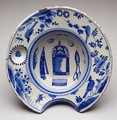
 |
English (Lambeth) Barber's Bowl About 1690 Tin-glazed earthenware 3-1/2 inches high, 10-1/4 inches in diameter Gift of Mr. and Mrs. George R. Steiner 96.36.6 |
- The popularity of Chinese porcelain in Europe led Dutch and English
manufacturers to make blue-and-white TIN-GLAZED
EARTHENWARE, because they had not yet discovered the formula for
porcelain production.
- In an attempt to duplicate porcelain's translucency and hardness,
the barber's bowl was dipped in a tin glaze, decorated with blue pigment,
and then fired at a very high temperature.
- The design of the bowl unites images of tools of the barber's trade
(such as scissors, a razor, and a comb) with bird and flower MOTIFS
adapted from Chinese porcelain.
- The shallow bowl with a semicircular opening in its broad rim proved
an essential barber's tool when held closely against the neck of the
man being shaved. When not in use, it was hung on the wall as a decoration.
![]()
Key ideas.
Where does it come from?
What does it look like?
How was it used?
How was it made?
Discussion questions.
Additional resources.
Select another piece.